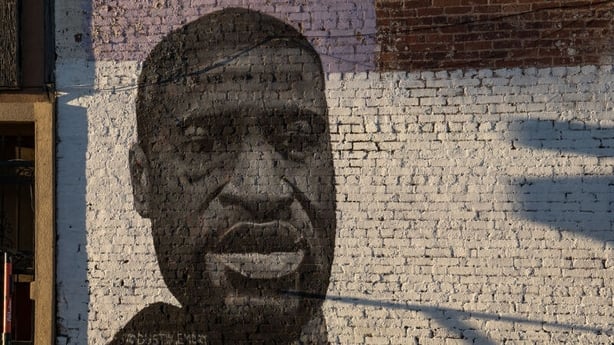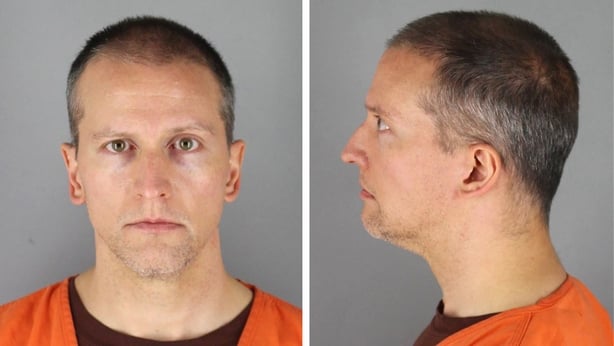Derek Chauvin broke Minneapolis Police Department rules and its ethics code governing the "sanctity of life" during his arrest of George Floyd in the US city last May, its police chief has testified at the former officer's murder trial.
"It's not part of our training, and it is certainly not part of our ethics and our values," Medaria Arradondo told the jury as prosecutors sought to undermine a central plank of Mr Chauvin's defence.
Mr Arradondo said he was alarmed when, a few hours after the arrest, he first saw a bystander's video showing Derek Chauvin, who is white, kneeling on the neck of George Floyd, a 46-year-old handcuffed black man, for more than nine minutes. The video sparked global protests against police brutality.
Mr Chauvin has pleaded not guilty to murder and manslaughter charges.
Prosecutors have called Mr Arradondo and other police officers to weaken Derek Chauvin's defence that he did only what he was trained to do in his 19 years as a police officer.
Mr Arradondo, who in 2017 became the first black person to lead the city's police force, fired Mr Chauvin and three other officers who were involved the day after Mr Floyd's death.
He also castigated Derek Chauvin in a statement last year, saying: "This was murder - it wasn't a lack of training."
Mr Arradondo said it was unusual for police to take someone into custody where the alleged crime was as minor as in the case of Mr Floyd, who was suspected of using a counterfeit $20 to buy cigarettes at the Cup Foods grocery store, a non-violent misdemeanour.
A prosecutor asked him to explain to the jury how police officers receive extensive training on how to use force and to reduce tensions.
"We are oftentimes the first face of government our community will see, and we will often meet them at their worst moments," he told the jury when asked to describe the meaning of the badge the city's roughly 700 sworn officers wear. "That has to count for something."
Officers carry tourniquets and are trained how to use them to treat gunshot wounds, they are taught how to do chest compressions, and they are given naloxone inhalers that can be used to rapidly reverse an opioid overdose, Mr Arradondo said.
He was asked to read aloud parts of the department's code of ethics.
"It's really about treating people with dignity and respect above all else," he told the jury.
Derek Chauvin did not follow his training in several different ways, Mr Arradondo said. Mr Chauvin used too much pressure on Mr Floyd's neck, the police chief said, pointing to police training that he said emphasised the "sanctity of life."
Mr Chauvin also did not "de-escalate" the situation even as George Floyd fell unconscious, and he did not provide the mandated first aid to a dying Mr Floyd, Mr Arradondo said.

In cross-examination, Eric Nelson, Mr Chauvin's lead lawyer, began with getting Mr Arradondo to say it had been "many years" since he himself had made an arrest.
"I'm not trying to be dismissive," Mr Nelson said. He also had Mr Arradondo agree with him that a police officer's use of force is often "not attractive."
Two paramedics who brought George Floyd to the Hennepin County Medical Center after his arrest on 25 May 2020 told Dr Bradford Langenfeld they had been trying to restart Mr Floyd's heart for about 30 minutes without success.
Dr Langenfeld, an emergency physician, testified he took over Mr Floyd's care. Asked by prosecutor Jerry Blackwell if the paramedics indicated that they suspected a drug overdose or heart attack, the doctor said they did not, indicating only that George Floyd's heart had stopped beating and that there may have been a delay in starting resuscitation efforts.
"It's well known that any amount of time that a patient spends in cardiac arrest without immediate CPR markedly decreases the chance of a good outcome," he told the jury.
Medical tests led Dr Langenfeld to think it was unlikely that Mr Floyd suffered a heart attack, he told the jury. The most likely explanation, the doctor said, was asphyxia.

Videos of George Floyd's arrest show that Derek Chauvin kept his knee on Mr Floyd's neck for more than three minutes after he appeared to have stopped breathing, and none of the police officers at the scene attempted to give George Floyd first-aid care.
Mr Nelson, Mr Chauvin's lawyer, asked Dr Langenfeld whether fentanyl could also lead to the low oxygen and high carbon dioxide levels in Mr Floyd's blood. Dr Langenfeld agreed it could.
Mr Floyd's girlfriend testified last week that he was addicted to opioids. A medical examiner who ruled George Floyd's death a homicide at the hands of police noted there was fentanyl in Mr Floyd's blood at post-mortem.
"Simply because someone has a history of chronic opioid abuse, does that mean fentanyl can't kill them?" Mr Nelson asked Dr Langenfeld. "No," the doctor replied.
The two paramedics testified last week, saying that Mr Floyd appeared already to be dead when they arrived and moved Mr Chauvin off his neck.
George Floyd was declared dead at 9.25pm, about 30 minutes after he arrived at the hospital and less than 90 minutes after police arrived outside the Cup Foods grocery store to arrest Mr Floyd on suspicion of his using a fake $20 bill to buy cigarettes.

